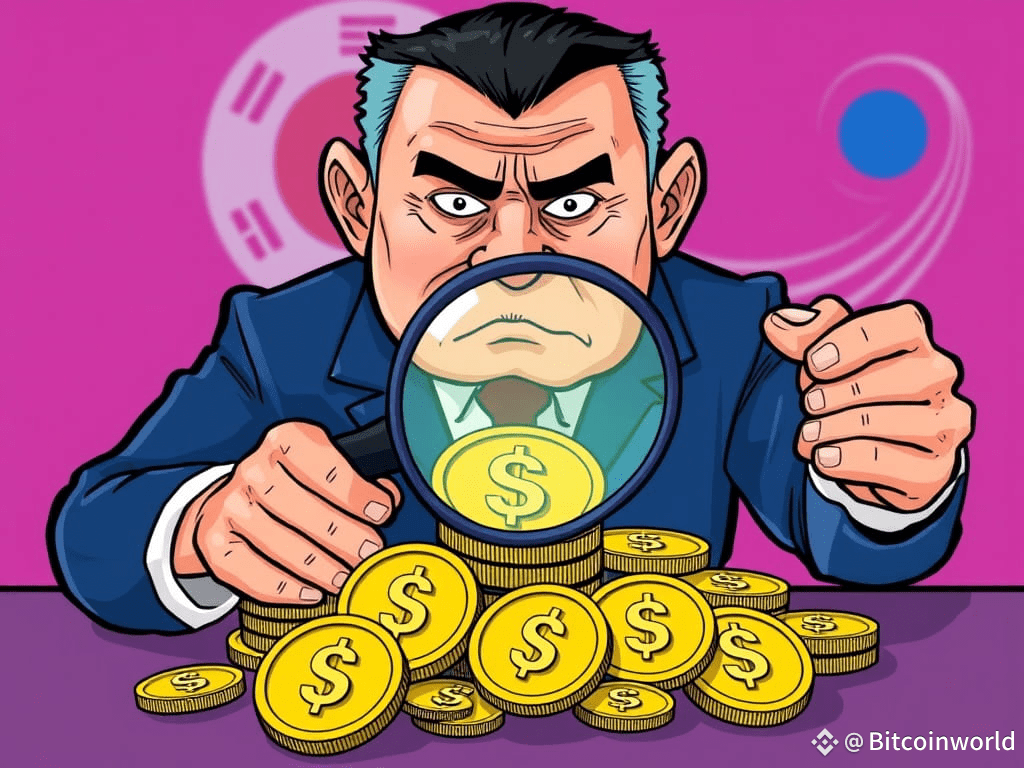BitcoinWorld  U.S. Dollar Stablecoins Face Urgent Warning from South Korea’s Central Bank
U.S. Dollar Stablecoins Face Urgent Warning from South Korea’s Central Bank
The digital currency landscape constantly evolves, and with it, the scrutiny from global financial institutions. Recently, South Korea’s central bank issued a significant warning regarding U.S. dollar stablecoins, urging tighter regulations. This move highlights growing concerns among nations about the potential impact of these digital assets on traditional financial systems and monetary sovereignty.
Why Are U.S. Dollar Stablecoins a Concern for South Korea?
The Bank of Korea (BOK) has voiced serious reservations. According to a Yonhap News report, the central bank believes the increasing popularity of U.S. dollar stablecoins poses a direct threat to the nation’s monetary sovereignty.
This concern stems from the potential for these digital assets to facilitate the evasion of existing foreign-exchange controls. In essence, if citizens extensively use stablecoins for transactions, it could bypass traditional banking channels and currency regulations.
The BOK conveyed these sentiments in a written response to People Power Party (PPP) lawmaker Park Sung-hoon on August 20. They emphasized the urgency of addressing this issue, stating that growing use could enable illicit capital flows.
How Do U.S. Dollar Stablecoins Impact Monetary Policy?
Beyond foreign-exchange evasion, the BOK identified broader implications. They warned that widespread adoption of U.S. dollar stablecoins could significantly erode the effectiveness of the country’s monetary policy.
Consider this: central banks manage inflation and economic stability primarily through controlling the money supply and interest rates. If a substantial portion of transactions occurs via stablecoins, the central bank’s tools become less potent.
This situation could lead to:
Undermined Monetary Sovereignty: The ability of the BOK to control its own currency and financial system diminishes.
Increased Currency Market Volatility: Capital outflows could become more frequent and harder to track, leading to instability in the Korean Won’s value.
Therefore, the central bank is advocating for prompt revisions to the Foreign Exchange Transactions Act. This legislative update aims to equip regulators with the necessary powers to oversee these digital assets effectively and manage risks associated with U.S. dollar stablecoins.
What’s Next for U.S. Dollar Stablecoins in South Korea?
The BOK’s clear stance signals a growing global trend among financial regulators. They are increasingly scrutinizing the impact of cryptocurrencies, especially those pegged to fiat currencies like U.S. dollar stablecoins.
For lawmakers in South Korea, the call to action is clear: swift legislative amendments are necessary. This will ensure the nation’s financial stability remains robust in the face of evolving digital financial instruments.
The debate over digital asset regulation is far from over. However, South Korea’s proactive approach sets a precedent for how nations might tackle the challenges posed by stablecoins to their economic frameworks. The future of U.S. dollar stablecoins in the region will undoubtedly be shaped by these ongoing discussions.
South Korea’s central bank has sounded a crucial alarm regarding U.S. dollar stablecoins. Their concerns about monetary sovereignty, foreign exchange control evasion, and policy effectiveness highlight the complex interplay between traditional finance and emerging digital assets. As the digital economy expands, robust regulatory frameworks become paramount for national economic stability.
Frequently Asked Questions (FAQs)
What are U.S. dollar stablecoins?
U.S. dollar stablecoins are cryptocurrencies designed to maintain a stable value by being pegged, typically 1:1, to the U.S. dollar. They aim to combine the stability of fiat currencies with the flexibility of digital assets.
Why is South Korea’s central bank concerned about U.S. dollar stablecoins?
The Bank of Korea (BOK) is concerned that the growing use of U.S. dollar stablecoins could threaten the country’s monetary sovereignty, enable evasion of foreign-exchange controls, and undermine the effectiveness of its monetary policy.
How could stablecoins impact South Korea’s monetary policy?
If stablecoins become widely adopted, the BOK fears it could reduce their ability to control the national money supply and interest rates, thereby weakening their influence over inflation and economic stability.
What action is the Bank of Korea recommending?
The BOK is calling for swift revisions to the Foreign Exchange Transactions Act to tighten oversight and establish clearer regulations for U.S. dollar stablecoins and other digital assets.
Is South Korea the only country concerned about stablecoin regulation?
No, many countries and central banks worldwide are actively discussing and developing regulations for stablecoins, recognizing their potential impact on financial stability and monetary systems.
Did you find this article insightful? Share it with your network on social media to spread awareness about the evolving landscape of U.S. dollar stablecoins and global financial regulation!
To learn more about the latest U.S. dollar stablecoins trends, explore our article on key developments shaping stablecoin regulation and its impact on global finance.
This post U.S. Dollar Stablecoins Face Urgent Warning from South Korea’s Central Bank first appeared on BitcoinWorld and is written by Editorial Team



